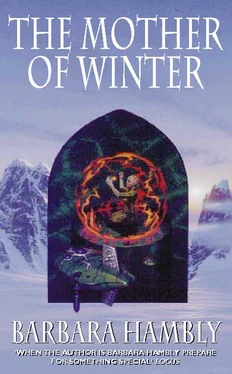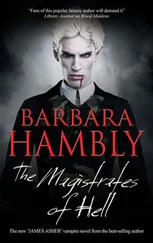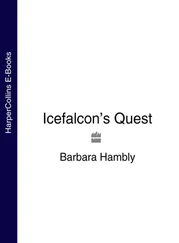1 ...6 7 8 10 11 12 ...21 “Sounds yummy.”
“Pray to your ancestors you never discover how yummy such fare can be.”
“We used to eat these things like rocks.” Rudy hadn’t heard Tir come up beside him. Small for his age and fragile-looking, Tir had a silence that was partly shyness, partly a kind of instinctive fastidiousness. Partly, Rudy was sure, it was the result of the subconscious weight of adult memories, adult fears.
“They were hard like rocks until you cooked them, and then they got kind of soft. Mama—the other little boy’s mama—used to mash them up with garlic.”
The Icefalcon raised his brows. He knew about the heritable memories—an old shaman of his tribe, he had told Rudy once, had them—and he knew enough not to put in words or questions that might confuse the child.
Rudy said casually, “Sounds like …” He didn’t know the word in the Wathe. “Sounds like what we call potatoes, Ace. Spuds. What’d that little boy call them?”
Tir frowned, fishing memories chasms deep. “Earth-apples.” He spoke slowly, forming a word Rudy had never heard anyone say in the five years of his dwelling in this world. “But they raised them in water, down in the tanks in the crypt. Lots and lots of them, rooms full of them. They showed that little boy,” he added, with a strange, distant look in his eyes.
“Who showed him, Ace?”
Melantrys, a curvy little blonde with a dire-wolf’s heart, was offering odds on the likelihood of Graw finding a reason not to send up any of the hay that was part of the Settlements’ tribute to the Keep come July—betting shirt-laces, a common currency around the watchroom, where they were always breaking—and there were shouts and jeers from that end of the room, so that Rudy had to pitch his voice soft, for Tir’s hearing alone.
Tir thought about it, his eyes unfocused. He was one of the cleanest little boys Rudy had ever encountered, in California or the Wathe. Even at the end of an afternoon with the herdkids, his jerkin of leather patches and heavy knitted blue wool was fairly spotless. God knew, Rudy thought, how long this phase would last.
“An old, old man,” Tir said after a time. He stared away into the darkness, past the lurching shadows of the Guards, the stray wisps of smoke and the flash of firelight on dagger blade and boot buckle. Past the night-black walls of the Keep itself. “Older than Ingold. Older than Old Man Gatson up on fifth north. He was bald, and he had a big nose, and he had blue designs on his arms and the backs of his hands, and one like a snake like this, all the way down his head.” Tir’s fingers traced a squiggly line down the center of his scalp, back to front. Rudy’s breath seemed to stop in his lungs with shock. “And it wasn’t a little boy,” Tir went on. “It was a grown-up man they showed. A king.”
It was the first time he had made the distinction. The first time he seemed to understand that all the little boys whose memories he shared had grown up to be men—and after living their lives, had died.
Rudy tried to keep his voice casual, not speaking the great wild whoop of elation that rang inside him. “You want to go exploring, Pugsley?”
“Okay.” Tir looked up at him and smiled, five years old again, rather solemn and shy but very much a child ready for whatever adventures time would bring his way.
“They won’t thank you, you know,” the Icefalcon remarked, not even looking up from his cleaning as they rose to go. “The know-alls of the Keep—Fargin Graw, and Enas Barrelstave, and Bannerlord Pnak, and Lady Sketh. Whatever you find, you know they shall say, ‘Oh, that. We could have found that any day, by chance.’ “
“You’re making me feel better and better about this,” Rudy said.
The White Raider picked a fragment of dried blood out of the tang of his knife. “Such is my mission in life.”
It’s him! Rudy thought as, hand in hand, he and Tir ascended the laundry-festooned Royal Stair. It’s him! For the first time, Tir’s memories had touched something that lay verifiably in the original Time of the Dark.
The old man with the big nose and the bald head and the tattoos on his scalp and hands was—had to be—the Guy with the Cats.
Records did not stretch to the first rising of the Dark. Gil and Ingold had unearthed archives dating back seven hundred years at Gae; two of the books salvaged from the wreck of the City of Wizards were copies of copies—said to be accurate—of volumes two thousand years old. The Church archives the ill-famed and unlamented Bishop Govannin had carried from the broken capital contained scrolls nearly that age, in dialects and tongues with which Ingold, for all his great scholarship, was wholly unfamiliar. When the mage and Gil had a chance to work on them, they had arrived at approximate translations of two or three—at least two of the others Gil guessed had been copied visually, without any knowledge of their meaning at all.
But in the Keep attics above the fifth level, in the hidden crypts below, and in the river caves up the valley, they had found gray crystalline polyhedrons, the size and shape of the milk-white glowstones: remnants of the technology of the Times Before. And when Gil figured out that the gray crystals were records, and Ingold learned how to read the images within, they got their first glimpse of what the world had been like before that catastrophe over three millennia ago.
The Guy with the Cats was in two of the record crystals.
The crystals themselves were magic, and readable only through the object Rudy described to himself as a scrying table found hidden in an untouched corner chamber of the third level south. But less than a dozen of the thirty-eight were about magic, about how to do magic. Even silent—neither Rudy nor Ingold had figured out how to activate the soundtrack, if there was a soundtrack—they were precious beyond words. Magic was used very differently in those days, linked with machines that Ingold had tried repeatedly—and failed repeatedly—to reproduce in the laboratory he set up in the crypts. But the crystals showed spells and power-circles that were clearly analogous to the methods wizards used now. These Rudy and Ingold studied, matching similarities and differences, trying with variable success to re-create the forgotten magic, even as Gil studied the silent images in the other stones to put together some idea of that vanished culture and world.
On the whole, Rudy guessed that their conclusions were about as accurate as the spoofs written in his own world about the conclusions “scientists of the distant future” would draw about American motels, toilets, and TV Guides.
But in the process, he and Gil had come to recognize by sight a bunch of people who died about the time of the Trojan War.
They had given them names; not respectful ones, perhaps, but convenient when Gil noted down the contents of each crystal.
The Dwarf.
Mr. Pomfritt—named less for his resemblance to a long-forgotten character in a TV show than for his precise, didactic way of explaining the massive spiral of stars, light, and silver-dust that funneled, Ingold said, a galaxy-wide sweep of power into something kept carefully out of sight in a small black glass dish.
The Bald Lady.
Mother Goose.
Scarface.
Black Bart.
And the Guy with the Cats.
And now Tir said that the Guy with the Cats had been in the Keep. That meant whoever that old mage was, he’d been of the generation that first saw the Dark Ones come.
The generation that fought them first. The generation that built the Keep.
“The little boy got lost here once,” Tir confided in a whisper as they wound their way along a secondary corridor on third south. Night was a time of anthill activity in the Keep, as suppers were cooked, business transacted, courtships furthered, and gossip hashed in the maze of interlocking cells, passageways, warrens, and bailiwicks that sometimes more resembled a succession of tight-packed villages than a single community, let alone a single building. Rudy paused to get an update on Lilibet Hornbeam’s abscess from a cousin or second cousin of that widespreading family; nodded civil greetings to Lord Ankres, one of the several noblemen who had survived to make it to the Keep—His Lordship gave him the smallest of chilly bows—and stopped by Tabnes Crabfruit’s little ill-lit workshop to ask how his wife was doing.
Читать дальше






